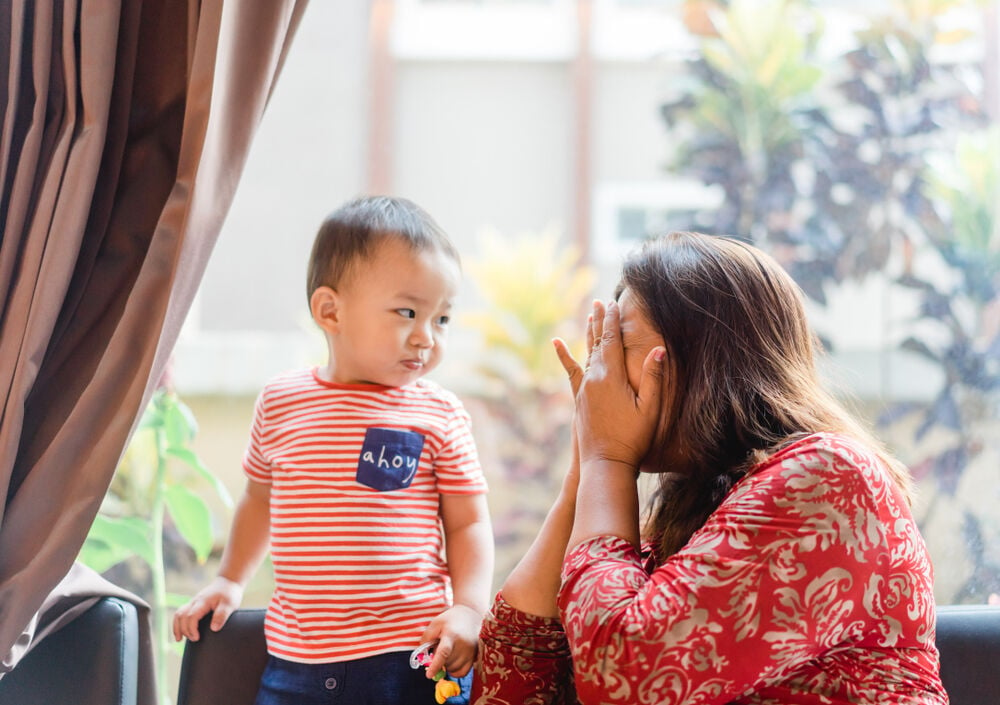Even from a very early age when their nervous systems are still developing, babies can feel frightened. These fears will morph as children grow older and become more familiar with their fears and how things work. In this piece, we take a look at common baby fears during the first year of life.
-
Tracking cycle
-
Getting pregnant
-
Pregnancy
-
Help Center
-
Flo for Partners
-
Anonymous Mode
-
Flo app reviews
-
Flo Premium New
-
Secret Chats New
-
Symptom Checker New
-
Your cycle
-
Health 360°
-
Getting pregnant
-
Pregnancy
-
Being a mom
-
LGBTQ+
-
Quizzes
-
Ovulation calculator
-
hCG calculator
-
Pregnancy test calculator
-
Menstrual cycle calculator
-
Period calculator
-
Implantation calculator
-
Pregnancy weeks to months calculator
-
Pregnancy due date calculator
-
IVF and FET due date calculator
-
Due date calculator by ultrasound
-
Medical Affairs
-
Science & Research
-
Pass It On Project New
-
Privacy Portal
-
Press Center
-
Flo Accuracy
-
Careers
-
Contact Us
Baby Fears: Tips That Actually Work


Every piece of content at Flo Health adheres to the highest editorial standards for language, style, and medical accuracy. To learn what we do to deliver the best health and lifestyle insights to you, check out our content review principles.
Most common baby fears
As we've already pointed out, babies develop fears from a very young age — including the first few months of their lives. As babies grow, their fears tend to change depending on their ability to perceive the environment around them.
In newborn babies, common baby fears include loud noises, falling, separation from parents, and strangers. At this stage, babies can't distinguish between objects accurately enough to be scared by looking at them. However, loud noises trigger the startle reflex. You might also notice this reflex — also known as the Moro reflex — when you lower your baby suddenly. It starts from birth and ends around 5-6 months. Your baby reacts this way because she feels like she has no support and is falling through the air. You can identify the startle reflex when you see the baby extending his or her limbs and arching the back before retracting them again. After a few months, you'll notice that your baby will stop giving this response and instead cry.
Towards the end of the first year, babies usually begin to appreciate the concept of object permanence. They can now understand that even if an object is not in their direct line of sight, it still exists. Babies can walk with one hand held, throw objects, say simple words like mama/dada/bye-bye, and follow one-step commands with gestures.
So, when you leave the room, your baby still has you on his or her mind and will wonder where you have gone and when you will return. He or she will fret if you don’t, increasing the fear of being abandoned. At the age of 1 year, walking away from mom may cause anxiety. If you leave your baby with a stranger, he or she will become anxious and regard them warily until you return.
I'm having such a fun time tracking my cycle with Flo. The features are great, especially the reminders I set to take my vitamins. I also love the info cards that explain how my body works. Definitely recommend it!
What to do if your baby has fears
Childhood fears in the first year are normal. However, it’s advisable to lend a helping hand to your baby so that he or she can overcome them. There are plenty of things you can do to ease kid fears.
First of all, you must recognize and accept your baby’s fears. By accepting them, you can then begin to sympathize with them. For instance, the blasting of car horns might not be a concern for you, but it scares your baby. You need to understand that this is your baby’s first contact with such a sound. Hold your baby close and soothe him or her with encouraging words. However, take care not to overdo the comforting aspect, lest you reinforce the notion that loud noises are really something to fear about.

Take a quiz
Find out what you can do with our Health Assistant
To ease the separation anxiety your baby feels, play games that involve you leaving for small amounts of time before appearing again. Peek-a-boo is a great place to start. After that, you can leave the room for a minute and come back. Keep increasing the length of the time you leave. By the time you want to leave for real, your baby will be used to the idea that when you leave, you’ll eventually come back. Not only does this ease the fear, but it also strengthens you for when you have to be away from your baby for long periods.
How can you help your kid deal with fears?
Before they reach one year of age, children fear things that might seem trivial to you. As we have already mentioned, your parenting duty is to be there for them so that they can come through this phase unaffected.
At this stage, almost everything a child does appears cute and adorable to you. You find yourself cooing at every reaction they have to the world around them. However, you should ensure that you’re not trivializing things that they find scary.
A scared jerk towards the noise of household appliances might seem adorable to you, but it’s your baby expressing real fear to something they consider truly frightening. It’s advisable, therefore, to refrain from laughing at the baby’s fear.
Another mistake many parents are prone to making is forcing the baby to face their fear. For example, your baby might be afraid of the house pet because of its incessant barking. It doesn’t help the baby one bit if you force her to be in the same room with the dog when she's displaying fear. In some cases, the dog might come up to the baby out of curiosity. While this might look good on your social media feed, it's actually cementing the fear of dogs deep into the psyche of your baby.
Let your baby discover on his or her own that the sounds are harmless. This way, he or she will be more open to accepting other sounds and noises as part of the normal environment.
Baby’s fears: when to seek help
Normally, children's fears lessen as they grow older. They leave behind the things they were afraid of and pick up new fears that are more often appropriate for their age.
However, sometimes your baby will continue to fear something that they should have outgrown. When these types of fears persist, they can turn into childhood phobias — persistent, irrational fears that wreak havoc on the mental well being of the child in the future.
So, when should you seek help from the pediatrician? Here are some scenarios that might warrant a visit to the doctor:
- If the fears seem extreme or are still prominent past the normal age and interfere with daily functioning and interpersonal relationships
- If the fear causes your baby to be extremely distressed and very upset
- If the fear is so extreme that it manifests into physical symptoms and signs like tummy aches, vomiting, and a rapid heart rate
- If the fear prevents your baby from falling asleep
These kinds of scenarios will also cause you to worry about the well being of your baby, potentially leading to depression if not checked. This can then lead to other health consequences on your part.


Hey, I'm Anique
I started using Flo app to track my period and ovulation because we wanted to have a baby.


The Flo app helped me learn about my body and spot ovulation signs during our conception journey.


I vividly
remember the day
that we switched
Flo into
Pregnancy Mode — it was
such a special
moment.
Real stories, real results
Learn how the Flo app became an amazing cheerleader for us on our conception journey.




